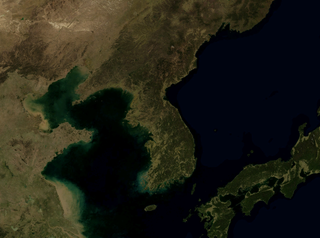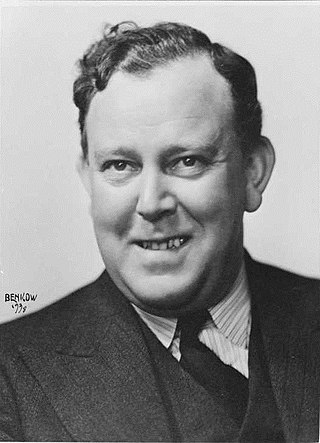
The Gulf War was an armed conflict between Iraq and a 42-country coalition led by the United States. The coalition's efforts against Iraq were carried out in two key phases: Operation Desert Shield, which marked the military buildup from August 1990 to January 1991; and Operation Desert Storm, which began with the aerial bombing campaign against Iraq on 17 January 1991 and came to a close with the American-led liberation of Kuwait on 28 February 1991.

The Authorization for Use of Military Force Against Iraq Resolution of 2002, informally known as the Iraq Resolution, is a joint resolution passed by the United States Congress in October 2002 as Public Law No. 107-243, authorizing the use of the United States Armed Forces against Saddam Hussein's Iraq government in what would be known as Operation Iraqi Freedom.

United Nations Security Council Resolution 687 was adopted on 3 April 1991. After reaffirming resolutions 660, 661, 662, 664, 665, 666, 667, 669, 670, 674, 677, 678 and 686 (1991), the Council set the terms, in a comprehensive resolution, with which Iraq was to comply after losing the Gulf War. Resolution 687 was passed by 12 votes to one (Cuba) against, with two abstentions from Ecuador and Yemen, after a very extended meeting. Iraq accepted the provisions of the resolution on 6 April 1991.

United Nations Security Council resolution 660, adopted on 2 August 1990, after noting its alarm of the invasion of Kuwait by Iraq, the council condemned the invasion and demanded Iraq withdraw immediately and unconditionally to positions as they were on 1 August 1990.

The Iraqi invasion of Kuwait began on 2 August 1990 and marked the beginning of the Gulf War. After defeating the State of Kuwait on 4 August 1990, Iraq went on to militarily occupy the country for the next seven months. The invasion was condemned internationally, and the United Nations Security Council (UNSC) adopted numerous resolutions urging Iraq to withdraw from Kuwaiti territory. The Iraqi military, however, continued to occupy Kuwait and defied all orders by the UNSC. After initially establishing the "Republic of Kuwait" as a puppet state, Iraq annexed the entire country on 28 August 1990; northern Kuwait became the Saddamiyat al-Mitla' District and was merged into the existing Basra Governorate, while southern Kuwait was carved out as the all-new Kuwait Governorate. By November 1990, the adoption of UNSC Resolution 678 officially issued Iraq an ultimatum to withdraw unconditionally by 15 January 1991 or else be removed by "all necessary means" from Kuwaiti territory. In anticipation of a war with Iraq, the UNSC authorized the assembly of an American-led military coalition.

In United Nations Security Council resolution 661, adopted on 6 August 1990, reaffirming Resolution 660 (1990) and noting Iraq's refusal to comply with it and Kuwait's right of self-defence, the Council took steps to implement international sanctions on Iraq under Chapter VII of the United Nations Charter. This was the second resolution by the Security Council over the invasion of Kuwait.

Resolution 82 was adopted by the United Nations Security Council (UNSC) on 25 June 1950. It condemned the "armed attack on the Republic of Korea by forces from North Korea", while calling for "the immediate cessation of hostilities" and for "the authorities in North Korea to withdraw forthwith their armed forces to the 38th parallel". The measure was adopted with 9 voting for, none opposed, and one abstention by the Soviet Union, who was boycotting the UN at the time for its recognition of the Republic of China as China's representative to the organization.

United Nations Security Council resolution 686, adopted on 2 March 1991, after reaffirming resolutions 660, 661, 662, 664, 665, 666, 667, 669, 670, 674, 677 and 678, the council noted the suspension of military activities against Iraq and that all twelve resolutions continue to have full force and effect.

United Nations Security Council resolution 706 decided on a mechanism to allow Iraq to sell oil in return for humanitarian aid from Member States. The council, acting under Chapter VII, adopted the resolution on 15 August 1991, after recalling resolutions 661 (1990), 686 (1991), 687 (1991), 688 (1991), 692 (1991), 699 (1991) and 705 (1991). The provisions of Resolution 706 functioned in a way similar to that which was later implemented in the Oil-for-Food Programme under Resolution 986 in 1995.
The Geneva Peace Conference was held on January 9, 1991, in Geneva, Switzerland, to find a peaceful solution to the Iraqi occupation of Kuwait in order to avoid a war between Ba'athist Iraq and the United States-backed coalition. Iraqi Foreign Minister Tariq Aziz represented Iraq, while U.S. Secretary of State James Baker was the United States representative. Lasting nearly seven hours, both parties refused to move on their initial positions. Iraq refused to withdraw from Kuwait, while the United States and its allies continued to demand Iraq's immediate withdrawal. The meeting was the final initiative that eventually led to the Gulf War.

United Nations Security Council resolution 665, adopted on 25 August 1990, after demanding the full and immediate implementation of resolutions 660, 661, 662 and 664, the council authorised a naval blockade to enforce the embargo against Iraq, in the aftermath of its invasion of Kuwait on 2 August 1990.

In United Nations Security Council Resolution 666, adopted on September 13, 1990, after recalling resolutions 661 (1990) and 664 (1990) which discussed the humanitarian situation in Iraq and Kuwait and the detention of nationals from foreign countries, the Council decided to ask the 661 Committee to determine if humanitarian needs have arisen and to keep the situation under review. At the same time, it expected Iraq to comply with its obligations under international law, including the Fourth Geneva Convention, relating to the safety and detainment of third-state nationals in Iraq and occupied Kuwait.

United Nations Security Council resolution 674, adopted on 29 October 1990, after recalling resolutions 660 (1990), 661 (1990), 662 (1990), 664 (1990), 665 (1990), 666 (1990), 667 (1990) and 670 (1990) on the topic of Iraq, the council condemned the continuing situation in occupied Kuwait after the Iraqi invasion on 2 August 1990, reaffirming the goal of the international community of maintaining international peace and security.

United Nations Security Council resolution 712, adopted on 19 September 1991, after recalling resolutions 661 (1990), 686 (1991), 687 (1991), 688 (1991), 692 (1991), 699 (1991), 705 (1991) and 706 (1991), the council, acting under Chapter VII, reaffirmed and discussed provisions of Resolution 706 and called for international co-operation.

United Nations Security Council resolution 949, adopted unanimously on 15 October 1994, after recalling previous resolutions including 678 (1990), 686 (1991), 687 (1991), 689 (1991) and 833 (1993) on Iraq, the council, acting under Chapter VII of the United Nations Charter, demanded that Iraq withdraw troops recently deployed to the border with Kuwait or face further measures.

Colombia–Malaysia relations refers to bilateral relations between Colombia and Malaysia. Colombia maintains an embassy in Kuala Lumpur, while the embassy of Malaysia in Lima, Peru is accredited to Colombia. Both countries are members of the Group of 77, Non-Aligned Movement and the Pacific Economic Cooperation Council.
The timeline of the Gulf War details the dates of the major events of the 1990–1991 war. It began with the Iraqi invasion of Kuwait on 2 August 1990 and ended with the Liberation of Kuwait by Coalition forces. Iraq subsequently agreed to the United Nations' demands on 28 February 1991. The ground war officially concluded with the signing of the armistice on 11 April 1991. However, the official end to Operation Desert Storm did not occur until sometime between 1996 - 1998. Major events in the aftermath include anti-Saddam Hussein uprisings in Iraq, massacres against the Kurds by the regime, Iraq formally recognizing the sovereignty of Kuwait in 1994, and eventually ending its cooperation with the United Nations Special Commission in 1998.

Iraq–Mexico relations are the diplomatic relations between the Republic of Iraq and the United Mexican States. Both nations are members of the United Nations.

The Helsinki Summit was a private, bilateral meeting between American President George H. W. Bush and Soviet President Mikhail Gorbachev that took place in Helsinki, Finland on September 9, 1990. Due to the vested interests of both the Soviet Union and the United States in the Gulf Crisis' resolution, August 1990 Iraqi invasion of Kuwait was the primary topic of discussion for the leaders during the Helsinki Summit. The concerted efforts at easing American-Soviet tensions in the aftermath of the Cold War was another prominent topic, among other notable current events. At the summit's conclusion, Presidents Bush and Gorbachev produced a document of joint statements that illuminated the areas in which the leaders had committed to aligning their foreign policy goals. The summit was followed by a press conference wherein members of the media questioned Presidents Bush and Gorbachev about the content of their meeting and the justifications for their joint statements.

The United Nations Secretary-General selection of 1950 took place as the Cold War turned hot in the Korean War. The Soviet Union vetoed Trygvie Lie's second term and offered to vote for any other candidate. However, the United States insisted that Lie had to continue in office as Secretary-General, pressuring its allies to abstain on all other candidates. When a Latin American candidate appeared to have enough votes to win, the United States threatened to use its veto for the first time. After a second round of voting with no candidates receiving the required majority, the Security Council informed the General Assembly that it had been unable to agree on a recommendation. The General Assembly then extended Lie's term for three years.















